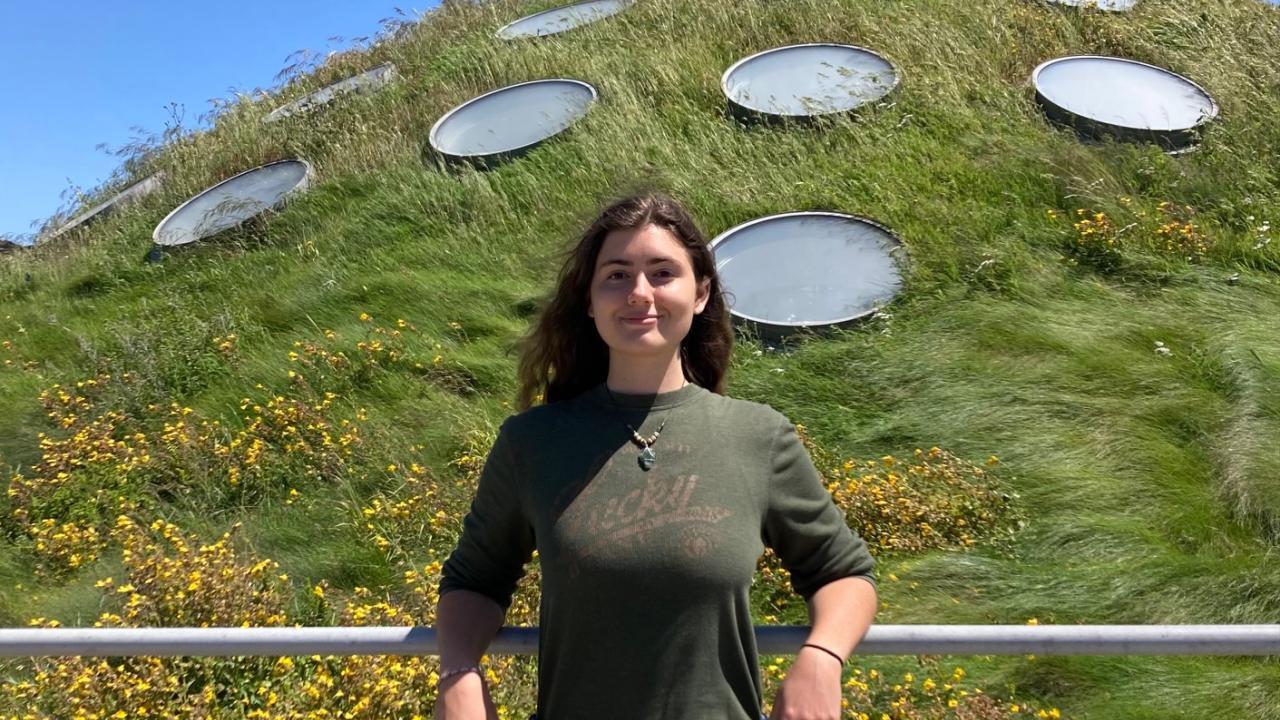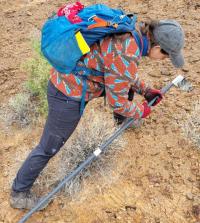
UC Davis Student Studying Ancient Microbial Life Named Goldwater Scholar
Quick Summary
- Caden Williams is among 413 college students nationwide selected for the Barry M. Goldwater Scholarship.
- At UC Davis, Williams studies Earth’s ancient microbial life, from analyzing existing communities in the frigid lakes of the Antarctic to uncovering fossils in the parched beds of Death Valley.
- Williams will use the award, which provides up to $7,500 for college expenses, to help her achieve her dream of becoming an astrobiologist.
An aspiring astrobiologist has been awarded a Barry M. Goldwater Scholarship, the nation’s leading scholarship for undergraduates pursuing research in the natural sciences, mathematics and engineering.
Caden Williams is among 413 college students nationwide selected from a pool of more than 5,000 applicants to receive the prestigious STEM scholarship, which was established by Congress in 1986 to honor the late U.S. Sen. Barry Goldwater. The award provides up to $7,500 for college expenses. This is the sixth consecutive year that a UC Davis student has been named a Goldwater Scholar.
“I could not have done this without being encouraged by my mentors: Dr. Dawn Sumner, Dr. Christy Grettenberger and Sarah King,” said Williams, who double majors in geology and environmental science and management. “I’ve learned so much from talking to them about their research, but they’re also just lovely people to work with.”
The importance of curiosity
Williams, a first-generation college student, credited her father for always encouraging her intellectual curiosity.
“My dad, who would often work 60-80 hour weeks as a Pepsi delivery driver, taught me the significance of hard work, keeping a positive attitude and to be interested in learning more about the world,” Williams said. “Navigating my career path as a first-generation student has not always been clear-cut or easy, but despite all the challenges, I will always find myself grateful for the opportunities I have that were denied to my family, who had to choose financially providing for their loved ones over being able to get an education.”
When Williams transferred to UC Davis in fall 2021 from Sierra College in Rocklin, California, she adopted a proactive attitude, connecting with her professors after classes and inquiring about undergraduate research opportunities. A geology professor connected Williams with Sumner, a professor in the Department of Earth and Planetary Sciences and a member of NASA’s Mars Science Laboratory. Sumner’s research focuses on restructuring the ancient environments of Earth and Mars, a topic that aligned with Williams’ research interests.
“I am curious about extreme environments and how organisms and their environment influence each other,” Williams said. “I strongly believe that answering the biggest outstanding scientific questions, including the origin of life, necessitates collaborative and interdisciplinary science. That’s why I’m studying diverse fields, from biology to geology.”
In addition to finding research opportunities, Williams dove headfirst into the campus community. Along with two other students, she founded the Geology Club at UC Davis, currently serving as club co-president.
“At Davis, I’m here on campus from morning until night and that’s by choice,” Williams said. “I honestly do just find a lot of things to do here.”
Studying ancient microbial life
Since enrolling at UC Davis, Williams has entrenched herself in the world of Earth’s ancient microbial life, from analyzing existing communities in the frigid lakes of the Antarctic to uncovering fossils in the parched beds of Death Valley.
“The interdisciplinary nature of my research has allowed me to learn from microbiologists, geologists and planetary scientists, which has been invaluable in developing my future career as an astrobiologist,” Williams said.

In a current research project, Williams is translating videos of microbial mats from Antarctica’s Lake Vanda into three-dimensional models that can be further analyzed.
“These communities display complex self-organization by forming microbial mats with pinnacle structures in response to environmental variables,” Williams said. “Understanding mechanisms of self-organization can aid in predicting ecosystem response to climate change.”
While Williams’ current research focuses on the terrestrial, her eyes are set on the skies above. Like Sumner does now, Williams hopes to work with space agencies to explore the solar system for signs of microbial life.
“Dr. Sumner has introduced me to just so many possibilities of where I could go with this type of work,” Williams said. “Where we go in the next 20 years is really going to build on our current work with astrobiology, because that’s the big question. Is there other life out there?”